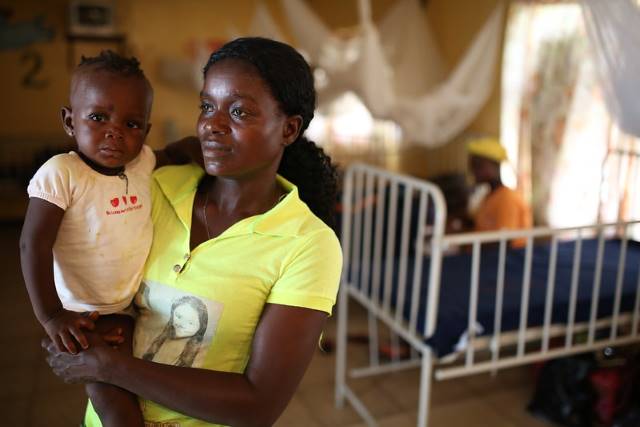Other Global Health Concerns During COVID-19
 COVID-19 has understandably been the main focus around the world. In developed countries, many are new to health epidemics and the disruptions caused by them. But, in some parts of the world, widespread disease is not new at all and COVID-19 is not the only health concern. There are several other global health concerns during COVID-19. Some seem obvious, like malaria or HIV/AIDS. But, some have made less news, like a toxic goldmine in Ethiopia. These health crises also require assistance and aid from the international community.
COVID-19 has understandably been the main focus around the world. In developed countries, many are new to health epidemics and the disruptions caused by them. But, in some parts of the world, widespread disease is not new at all and COVID-19 is not the only health concern. There are several other global health concerns during COVID-19. Some seem obvious, like malaria or HIV/AIDS. But, some have made less news, like a toxic goldmine in Ethiopia. These health crises also require assistance and aid from the international community.
HIV/AIDS in South Africa
In 2019, it was estimated that more than seven million people in South Africa were living with HIV. Roughly 200,000 of those people were newly diagnosed in 2019, and in that same year, 72,000 people died. Though 70% of people receive antiretroviral therapy (ART), the disease remains incurable. Its prevalence makes it one of the priority health concerns during COVID-19.
Though South Africa has the largest population of people living with HIV in the world, it has made a lot of progress. Data indicates that in 2018, 90% of infected individuals were aware of their status and 87% of people receiving treatment were virally suppressed, meaning they do not transfer the virus. Despite this success, rates continue to increase and it disproportionately affects women and young girls.
In 2016, South Africa made treatment for HIV free to all, where it used to be available only to those with advanced infections. This comes after South Africa made pre-exposure prophylaxis (PrEP) available to all sex workers to prevent HIV contraction in the first place. Though it did take years for South Africa to acknowledge this epidemic, the country is making progress. However, more focus and attention needs to go toward addressing HIV/AIDs in South Africa as it is a significant health crisis.
Malaria in sub-Saharan Africa
COVID-19 severely affected sub-Saharan Africa’s access to insecticide-treated nets (ITN) and malaria treatments. The World Health Organization (WHO) urged nations to resume the distribution of these things, in fear that mortality rates in 2020 would reach 769,000, which is double the rates of 2018.
Preventative treatments, which deliver antimalarial medication to asymptomatic people, aimed at school-aged children, has shown to significantly reduce the risk of contracting malaria. Health officials in sub-Saharan Africa have been urged to take heed of this, but the poverty affecting the region limits progress.
A whole 90% of global malaria deaths happen in sub-Saharan Africa, and of that figure, 78% of victims are children. Malaria is a treatable condition, but those most susceptible to it usually live in a state of poverty, unable to afford treatment. Malaria in sub-Saharan Africa is one of the most pressing global health concerns besides COVID-19.
Toxic Gold Mine in Ethiopia
Gold mining is an important industry in Ethiopia. The export of gold and similar minerals makes up 7-10% of Ethiopia’s export earnings. Hundreds of thousands of people are employed in the mines, both skilled and unskilled.
But, in Ethiopia’s most populous region, Oromia, a gold mine has released harmful contaminants that have severely affected people. Serious deficiencies in mine management have left the soil and water contaminated with dangerous levels of cyanide, arsenic and mercury. This contamination resulted in high rates of miscarriage, stillbirths and infant mortality, birth defects, the destruction of livestock and crops and locals are afflicted with debilitating illnesses. Residents say there was no warning about potential toxins,
The mine was considered so toxic that the situation was deemed a violation of human rights. After pushback from the citizens, it was temporarily shut down, but there was no accountability or treatment for those affected. There remains doubt whether the air and water are now safe and residents anticipate that the mine will be reopened. In August 2020, mineworkers were asked to attend a meeting, cementing this assumption. In collaboration, human rights organizations submitted a document to the Human Rights Committee entailing Ethiopia’s violations of rights in regard to the contaminated mine. It documents Ethiopia’s failures and necessary reparations that should be made to people.
To safeguard the well-being of the Ethiopian people and ensure that aid is provided to the affected people, it is essential for the international community to get involved.
COVID-19 and Other Global Health Concerns
The COVID-19 pandemic has upset the health of nations globally, no matter the resources a country has. But, it has also overshadowed some pressing issues. There are other major health concerns during COVID-19 that need international attention and aid as well.
– Maddey Bussmann
Photo: Flickr
